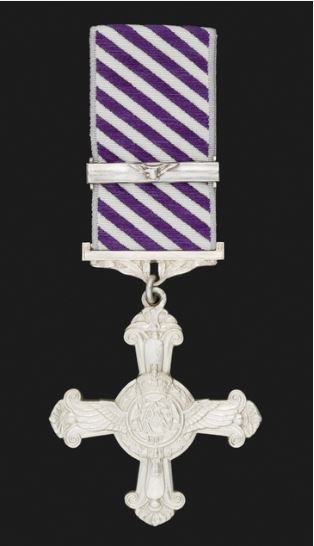Difference between revisions of "Distinguished Flying Cross"
From Our Contribution
(→Awarded to) |
(→Awarded to) |
||
| Line 28: | Line 28: | ||
*[[Phillip Herbert Martin DFC & Bar]] | *[[Phillip Herbert Martin DFC & Bar]] | ||
*[[Frank Keith Morcombe DFC]] | *[[Frank Keith Morcombe DFC]] | ||
| − | *[[Colin Lindsay Ottaway]] | + | *[[Colin Lindsay Ottaway DFC]] |
*[[Leslie John (Jock) Powell]] | *[[Leslie John (Jock) Powell]] | ||
Revision as of 03:09, 12 January 2020
 | |
Eligibility
The Distinguished Flying Cross (DFC) is the third-level military decoration awarded to officers of other Commonwealth countries, for "an act or acts of valour, courage or devotion to duty whilst flying in active operations against the enemy.
From 1918 to 1972 the DFC was awarded to 2,391 Australians, along with 144 first Bars and five second Bars. The photo depicts a DFC with one Bar.
Description
The decoration, designed by Edward Carter Preston, is a cross, 54.0 mm wide. The horizontal and bottom bars are terminated with bumps, the upper bar with a rose. The decoration's face features aeroplane propellers, superimposed on the vertical arms of the cross, and wings on the horizontal arms. In the centre is a laurel wreath around the RAF monogram, surmounted by a heraldic Imperial Crown.
The reverse is plain, except for a central roundel bearing the reigning monarch's cypher and the date '1918'. The year of issue is engraved on the reverse lower limb of cross.
The suspender is straight and decorated with laurel wreaths. The ribbon bar denoting a further award is silver, with the Royal Air Force eagle in its centre. The 32 mm wide ribbon is white with purple broad diagonal stripes
Awarded to
- Phillip Herbert Martin DFC & Bar
- Frank Keith Morcombe DFC
- Colin Lindsay Ottaway DFC
- Leslie John (Jock) Powell
Notes
Content for the eligibility and description sections has come from a combination of Wikipedia and the Australian War Memorial websites.